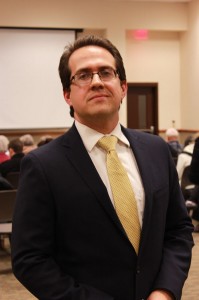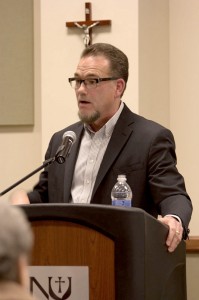The Gerber Institute for Catholic Studies at Newman University hosted a panel discussion on Jan. 23 over the topic of the Death Penalty in Kansas. The panel featured Josh Papsdorf, associate professor of theology at Newman University; Michael Birzer, professor of criminal justice and director of the School of Community Affairs at Wichita State University; and Carolyn McGinn, state senator from the 31st District in Kansas.
The mixed professions of the panelists provided a wide range of views covering religion, law, and politics.
Although Kansas is currently one of 32 states that allow the death penalty, Senate Bill 126 would revoke the death penalty and establish life without possibility of parole as the maximum sentence Kansas could impose.
Josh Papsdorf

Papsdorf discussed the death penalty from a theologian’s perspective. After referring to a few Old Testament scriptures he stated that “There does seem to be a lot of passages that support the use of capital punishment.” However, Padsdorf went on to explain that most modern Catholic leaders such as Pope Benadict XVI and Pope Francis oppose the death penalty. “Instead of promoting human dignity,” he continued, “the use of capital punishment has the opposite effects and leaves people to value human life less and leaves a sense of vengeance. ”
Michael Birzer
Birzer took a quantitative approach to the debate by discussing history and statistics and broke the conversation down into three sections.
In 1972, the U.S. Supreme Court ruled capital punishment unconstitutional and was deemed cruel and unusual punishment. With the introduction of lethal injection in 1976, Kansas decided that capital punishment was no longer cruel and unusual and is humane. It wasn’t until 1994 that capital punishment was reinstated in Kansas.

More than 3,000 inmates currently sit on death row in the United States – most of which are in southern states. California currently houses 731 inmates on death row with Texas following in second place with 298. 1,363 deaths have resulted in the U.S. as result of capital punishment since the death penalty was reinstated by the Supreme Court in 1976.
One of the main purposes of capital punishment was thought to be that it deters others from committing such acts. Birzer argued the opposite by comparing simple analytics. “Just look at the states that have capital punishment and then look at the murder rates,” he said. “They’re proportionately higher than states that don’t have capital punishment.”
Birzer went on to argue that proportionately more minorities are likely to be executed under the death penalty due to disparity. “African Americans represent 40 percent of the entire U.S. prison population,” Birzer said. “Now, I submit to you that whenever we have numbers like that, we have disparities and we have a group (African Americans) that represents only about 12 percent of that population, that’s a red flag .”
Carolyn McGinn

The death penalty debate often brings up the subject of cost and whether it would save taxpayer’s money to enforce the death penalty instead of supporting a prisoner in prison for life. McGinn talked about the cost of a death penalty case compared to cases considering sentences of life in prison. “In the 2003 audit, [a death penalty case] is about 70 percent higher.,” she said.
The panel discussion speakers spoke in unison of abolishing the death penalty in Kansas. However, the debate as a whole is far more divided across the state.

